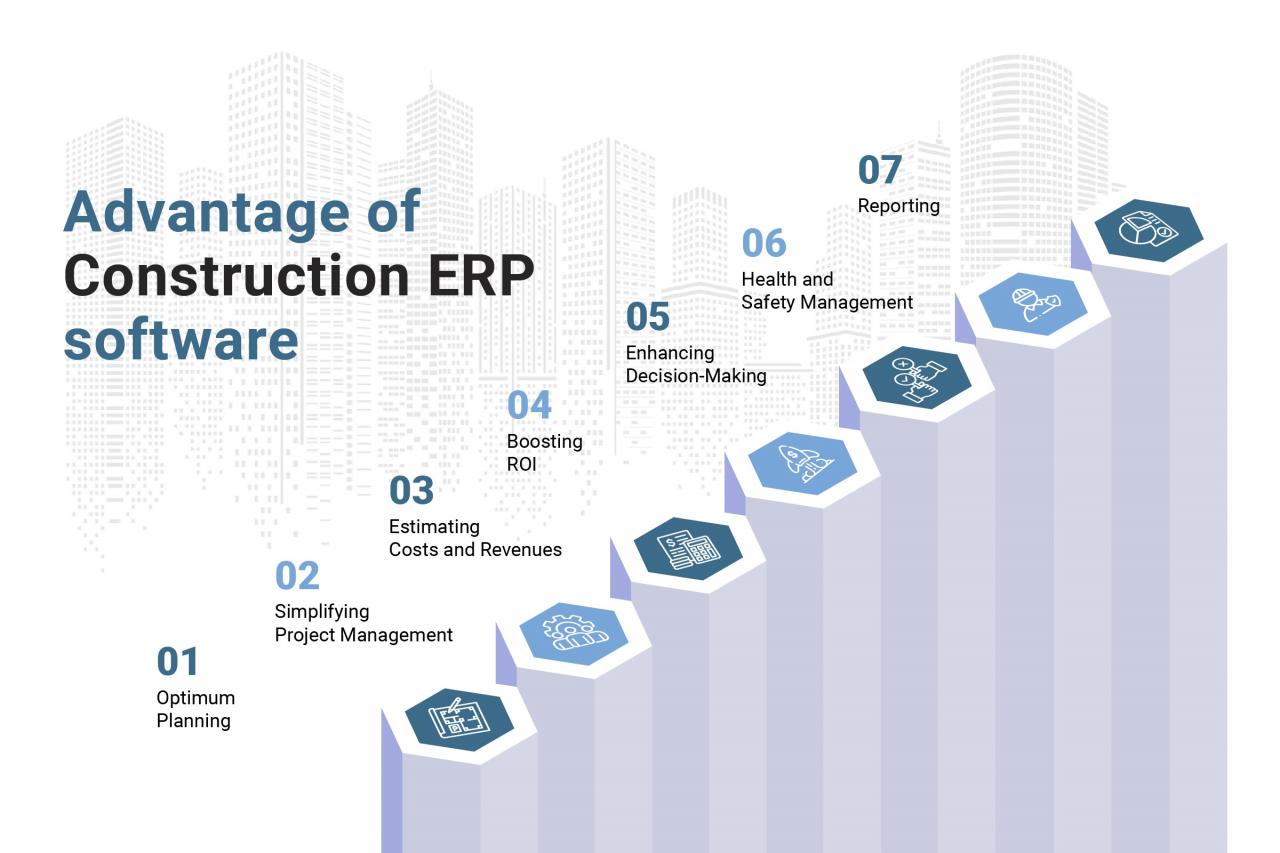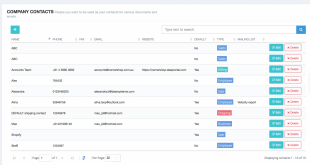Construction ERP companies are revolutionizing the construction industry by providing innovative software solutions that streamline operations, enhance collaboration, and drive efficiency. These systems integrate various aspects of construction management, enabling real-time data sharing, improved decision-making, and increased profitability.
As the industry embraces digital transformation, construction ERP companies are playing a pivotal role in shaping the future of construction.
Market Overview
The construction ERP market is experiencing substantial growth, driven by increasing adoption of digital technologies and the need for improved efficiency and collaboration in the construction industry. The global construction ERP market size was valued at USD 2.03 billion in 2022 and is projected to reach USD 4.65 billion by 2029, exhibiting a CAGR of 11.5% during the forecast period.
Key Trends and Drivers
Key trends shaping the construction ERP market include the rise of cloud-based ERP solutions, the integration of artificial intelligence (AI) and machine learning (ML) technologies, and the increasing adoption of mobile ERP applications. These trends are driven by the need for improved data accessibility, real-time collaboration, and enhanced decision-making capabilities.
Competitive Landscape
The construction ERP market is highly competitive, with several major players offering a wide range of solutions. Some of the key players include Oracle, SAP, Microsoft, Trimble, and Infor. These companies are investing heavily in research and development to enhance their offerings and gain a competitive edge.
Key Features and Benefits
Construction ERP systems are comprehensive software solutions that streamline and automate various aspects of construction operations. They provide a centralized platform for managing projects, resources, finances, and collaboration, leading to improved efficiency, productivity, and profitability.
These systems offer a range of core features, including project management, resource planning, financial management, document management, and collaboration tools. By integrating these functions into a single platform, construction ERP systems eliminate the need for multiple disparate systems, reducing data silos and improving communication.
Improved Efficiency
Construction ERP systems automate many manual processes, such as project scheduling, resource allocation, and document tracking. This automation reduces the time and effort required to complete tasks, freeing up project managers and other team members to focus on more strategic initiatives.
Enhanced Productivity, Construction erp companies
By providing real-time visibility into project progress, resource availability, and financial performance, construction ERP systems enable project teams to make informed decisions and take proactive measures to address potential issues. This improved visibility leads to increased productivity and reduced project delays.
Improved Collaboration
Construction ERP systems provide a central repository for project documents, plans, and communications. This centralized platform facilitates collaboration among team members, regardless of their location or device. By enabling seamless information sharing and communication, construction ERP systems improve coordination and reduce the risk of errors.
Examples of Successful Implementations
Numerous construction companies have successfully implemented construction ERP systems to achieve significant benefits. For example, Turner Construction Company reported a 20% increase in project efficiency and a 15% reduction in project costs after implementing a construction ERP system.
Selection Criteria
Selecting the right construction ERP system is crucial for streamlining operations and maximizing project efficiency. Here are key factors to consider:
Functionality:Assess if the system meets your specific business needs, including project management, estimating, scheduling, and document management.
Scalability
- Consider your current and future project size and complexity.
- Ensure the system can handle growing data volumes and increasing user demands.
Cost
- Evaluate the total cost of ownership, including software licensing, implementation, and ongoing support.
- Consider the potential return on investment (ROI) and the impact on project profitability.
Vendor Support
- Choose a vendor with a proven track record of providing responsive and reliable support.
- Assess the vendor’s knowledge of the construction industry and their ability to address your specific needs.
Implementation Expertise
- Partner with a vendor that offers experienced implementation services to ensure a smooth and successful rollout.
- Consider the vendor’s project management capabilities and their understanding of your business processes.
Implementation and Best Practices: Construction Erp Companies

Implementing a construction ERP system is a complex process that requires careful planning and execution. By following best practices and addressing common challenges, organizations can ensure a successful implementation that delivers the desired benefits.
The implementation process typically involves the following steps:
- Planning and assessment: This phase involves defining the project scope, identifying stakeholders, and conducting a thorough assessment of the organization’s needs.
- Software selection: Organizations should evaluate different ERP solutions and select the one that best meets their specific requirements.
- Data migration: Data from existing systems must be migrated to the new ERP system. This process requires careful planning and execution to ensure data integrity.
- Configuration and customization: The ERP system must be configured to meet the organization’s unique business processes. This may involve customizing the system or integrating it with other software applications.
- Training and support: Users must be trained on the new ERP system to ensure they can use it effectively. Ongoing support is also essential to address any issues that may arise.
Best Practices for Successful Implementation
- Involve stakeholders throughout the process.
- Define clear goals and objectives.
- Establish a dedicated project team.
- Conduct thorough testing.
- Provide ongoing training and support.
Common Challenges and How to Overcome Them
- Data migration issues:Careful planning and data validation can help mitigate these issues.
- Resistance to change:Effective communication and training can help users overcome resistance to the new system.
- Integration challenges:Proper planning and testing can ensure smooth integration with other software applications.
- Lack of expertise:Partnering with experienced implementation consultants can provide the necessary expertise.
Future Trends
The construction industry is undergoing a digital transformation, driven by the adoption of emerging technologies such as artificial intelligence (AI), machine learning (ML), and cloud computing. These technologies are revolutionizing the way construction projects are planned, executed, and managed.
The integration of these technologies into construction ERP systems is creating new opportunities for businesses to improve efficiency, reduce costs, and increase profitability.
Artificial Intelligence (AI)
AI is being used to automate tasks, improve decision-making, and provide real-time insights into project performance. For example, AI-powered systems can be used to:
- Identify potential risks and delays
- Optimize resource allocation
- Generate accurate estimates
- Create personalized reports
Machine Learning (ML)
ML algorithms can be used to analyze large datasets and identify patterns and trends. This information can be used to improve forecasting, predict outcomes, and make better decisions. For example, ML algorithms can be used to:
- Identify the most profitable projects
- Predict project costs and timelines
- Develop predictive maintenance schedules
- Optimize supply chain management
Cloud Computing
Cloud computing provides access to powerful computing resources and software applications over the internet. This allows construction businesses to scale their operations quickly and easily, without having to invest in expensive hardware or software. Cloud-based ERP systems also offer a number of benefits, such as:
- Increased flexibility and scalability
- Reduced costs
- Improved collaboration
- Enhanced security
Integration with Other Construction Technologies
Construction ERP systems are also being integrated with other construction technologies, such as building information modeling (BIM), project management software, and field data collection tools. This integration is creating a more connected and efficient construction ecosystem.
By leveraging these emerging technologies, construction businesses can gain a competitive advantage and improve their overall performance.
Closing Notes

In conclusion, construction ERP companies are essential partners for construction businesses seeking to optimize their operations and gain a competitive edge. By leveraging the latest technologies and industry best practices, these companies empower construction professionals to deliver exceptional projects, improve profitability, and drive the industry forward.
Originally posted 2024-05-20 13:48:29.
 Bussines News Daily
Bussines News Daily



